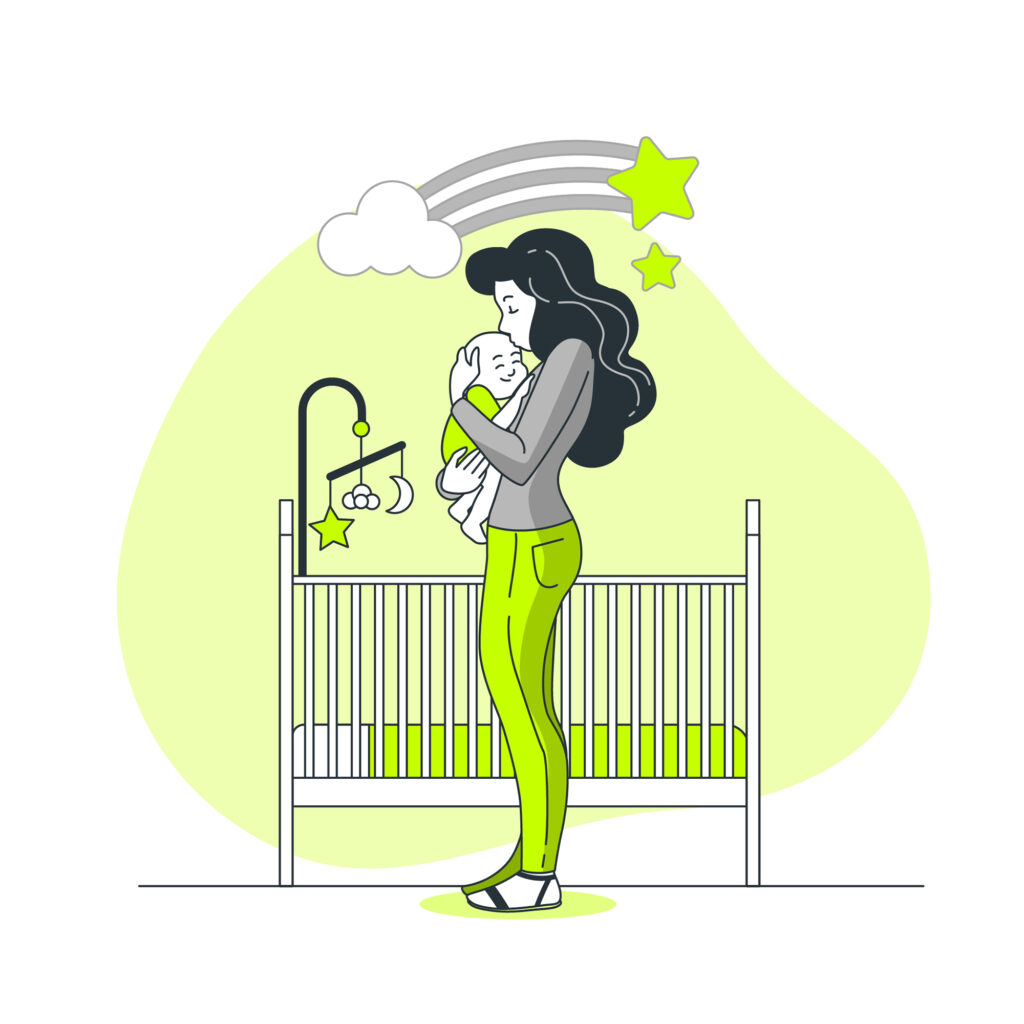Parenting Tips for Newborns are crucial for first-time and experienced parents alike as they begin the journey of raising their little ones. The arrival of a newborn is a life-changing event, filled with joy and challenges. Understanding the fundamentals of newborn care, including feeding, sleeping, and bonding, is essential to ensure a smooth transition for both the baby and the parents. As a leading provider of high-quality baby cradles, we understand the importance of having the right tools and guidance. This comprehensive guide will provide expert advice on nurturing your newborn, focusing on creating a supportive environment and making informed decisions for your baby’s well-being.
1.Parenting Tips for Newborns: Understanding Your Newborn’s Needs
Grasping your newborn’s basic needs is the foundation of effective parenting tips for newborns. Newborns are entirely reliant on their caregivers, and meeting their needs promptly and appropriately is crucial. Here’s a more in-depth look at the important aspects:
Feeding: Newborns generally require feeding every 2 to 3 hours.. Whether you choose breastfeeding or formula feeding, it’s important to ensure that your baby is getting adequate nutrition. Breastfeeding has numerous benefits, including providing essential antibodies and nutrients. Formula feeding, on the other hand, offers convenience and can be tailored to meet specific dietary needs. Consult with your pediatrician to determine the best feeding method for your baby. Pay attention to hunger cues such as rooting, sucking on their hands, or fussiness, and respond promptly.
- Sleep: Newborns spend a significant portion of their day sleeping, often up to 16-18 hours in a 24-hour period. Their sleep is typically in short bursts, and they may wake frequently throughout the night. Establishing a soothing sleep environment can help improve sleep quality. A high-quality baby cradle is essential in creating a safe and comfortable sleep space. The cradle’s gentle rocking motion can simulate the feeling of being held, helping your baby to settle more easily. Ensure the cradle has a firm, flat mattress to support your baby’s developing spine.
- Diapering: Frequent diaper changes are necessary to keep your baby comfortable and prevent diaper rash. Newborns can go through 8-12 diapers a day, so having a well-stocked supply is crucial. Choose a gentle, hypoallergenic diaper cream to protect your baby’s sensitive skin. Regularly inspect the diaper area for signs of irritation or rash and address any issues promptly. Establish a routine for diaper changes, including before and after feeding and before bedtime.
- Health Monitoring: Regular check-ups with your pediatrician are vital for tracking your baby’s growth and development. These visits allow for vaccinations, developmental assessments, and addressing any health concerns. Keep a record of your baby’s milestones, such as rolling over, crawling, and walking. Maintaining open communication with your healthcare provider ensures that any issues are addressed promptly and that your baby is on track with their growth and development.
-
Parenting Tips for Newborns: Choosing the Right Baby Cradle
Selecting the right baby cradle is a significant decision in your newborn’s sleep environment. Here are expanded parenting tips for newborns to consider:
- Safety First: When choosing a cradle, safety should be your top priority. Ensure the cradle complies with current safety standards and has been tested for stability. Look for cradles with a firm, snugly fitting mattress and avoid models with large gaps where a baby’s limbs could get stuck. The cradle should have no sharp edges, loose parts, or other potential hazards. If the cradle includes a rocking mechanism, ensure it is secure and not prone to tipping.
- Comfort: The cradle should offer a comfortable sleeping surface. Opt for a cradle with a breathable, hypoallergenic mattress that provides adequate support for your baby’s spine. The cradle’s design should promote a restful sleep environment, with features that minimize disturbances. For example, some cradles come with adjustable incline settings to help with issues like reflux.
- Portability: A portable cradle is beneficial for keeping your baby close throughout the day. Look for a cradle that’s easy to move from room to room, allowing you to keep an eye on your baby while attending to household tasks. Some cradles feature wheels or a foldable design for added convenience.
- Additional Features: Many cradles come with added features designed to soothe your baby. Consider cradles with built-in mobiles, soothing sounds, or vibration settings. These features can provide visual and auditory stimulation, helping to calm your baby and improve their sleep quality. Ensure any additional features are safe and easy to operate.
-
Parenting Tips for Newborns: Establishing a Routine
Creating a consistent routine is one of the most effective parenting tips for newborns. Routines help your baby feel secure and establish predictable patterns. Here’s how to create and maintain a routine:
- Sleep Schedule: Consistency is key when establishing a sleep schedule. Aim to put your baby to sleep at the same time each night and create a bedtime routine that signals it’s time for sleep. This could include activities like a warm bath, gentle rocking in the cradle, or reading a short, soothing story. A regular sleep schedule helps regulate your baby’s internal clock, promoting longer and more restful sleep.
- Feeding Times: Maintain a consistent feeding schedule to help your baby develop a reliable feeding pattern. This routine can be established by feeding your baby at regular intervals and paying attention to their hunger cues. Consistent feeding times can also contribute to better sleep patterns, as a well-fed baby is more likely to sleep soundly.
- Bonding Activities: Incorporate bonding activities into your daily routine to strengthen your emotional connection with your baby. Spend time engaging in activities such as gentle play, singing lullabies, or talking to your baby. These interactions promote emotional security and contribute to your baby’s overall development. Regular bonding time can also help your baby feel more relaxed and content.
-
Parenting Tips for Newborns: Ensuring a Safe Sleep Environment
Creating a safe sleep environment is critical for your baby’s well-being. Here are additional parenting tips for newborns to ensure a safe sleep setting:
- Back to Sleep: Always lay your infant on their back to sleep.. This practice reduces the risk of Sudden Infant Death Syndrome (SIDS). Ensure the sleep surface is firm and flat, with no loose bedding or soft objects that could pose a suffocation risk. If your baby rolls over during sleep, gently return them to their back without disturbing their rest.
- No Loose Bedding: Keep the cradle free from loose bedding, pillows, or stuffed animals. These items can create a suffocation hazard. Use a fitted sheet that is snugly secured to the mattress and avoid using blankets or quilts.Instead, wrap your infant in a sleep sack or wearable blanket to keep them warm
- Temperature Control: Maintain a comfortable room temperature to prevent overheating, which can increase the risk of SIDS. The recommended room temperature for a newborn is between 68-72°F (20-22°C). Dress your baby in lightweight layers and use a sleep sack or wearable blanket to regulate their temperature.Avoid over-bundling, which can cause overheating.
- Safe Sleep Position: Ensure your baby sleeps with their head and face uncovered. Avoid placing your baby to sleep on their stomach or side, as these positions can increase the risk of SIDS. If your baby prefers to sleep in a specific position, consult with your pediatrician for guidance on safe sleep practices.
-
Parenting Tips for Newborns: Understanding Sleep Patterns
Newborn sleep patterns can be erratic and unpredictable. Here’s how to manage and understand these patterns using some parenting tips for newborns:
- Day and Night Confusion: Newborns often struggle with day and night confusion. Help your baby adjust their sleep-wake cycle by exposing them to natural light during the day and keeping the room dark and quiet at night.A consistent bedtime routine might also assist your infant understand when it’s time to sleep.
- Short Naps: Newborns typically take frequent short naps throughout the day. This pattern is normal and necessary for their growth and development. As your baby grows older, they will gradually consolidate their naps into longer periods. Be patient and flexible with their sleep schedule, and adapt as needed.
- Sleep Regressions: Sleep regressions are periods when your baby’s sleep patterns may become disrupted. These regressions often coincide with developmental milestones, such as learning to crawl or walk. Maintain your bedtime routine and provide extra comfort during these times. If sleep regressions persist or become severe, consult with your pediatrician for additional guidance.
- Parenting Tips for Newborns: Bonding with Your Newborn
Bonding with your baby is critical for their emotional and psychological growth.Here are some expanded parenting tips for newborns to enhance bonding:
- Skin-to-Skin Contact: Spend time holding your baby skin-to-skin. This practice promotes bonding and can help regulate your baby’s body temperature, heart rate, and breathing. Skin-to-skin contact also supports breastfeeding and can improve your baby’s overall comfort and well-being.
- Gentle Touch: Use gentle, soothing touches when handling your baby. This helps them feel secure and loved. Incorporate activities such as gentle rocking in the cradle or giving your baby a gentle massage. These interactions contribute to your baby’s emotional development and help build a strong parent-child bond.
- Eye Contact and Communication: Engage in eye contact and talk to your baby.Your sound and facial expressions provide comfort and support. Sing lullabies, read stories, or simply talk to your baby about your day. These interactions help with your baby’s cognitive development and promote a sense of security.
- Parenting Tips for Newborns: Dealing with Common Issues

Every parent encounters challenges during the early months. Here are some common issues and parenting tips for newborns to address them:
- Colic: Colic is characterized by excessive crying and fussiness. Try soothing techniques such as gentle rocking in the cradle, using a pacifier, or giving your baby a warm bath. White noise machines or soothing music can also help calm a colicky baby. If colic persists or becomes severe, consult with your pediatrician for additional advice and support.
- Reflux: Reflux, or gastroesophageal reflux disease (GERD), can cause discomfort and frequent spitting up. Feed your baby in an upright position and burp them frequently during and after feedings. If your baby experiences significant discomfort or persistent symptoms, consult your pediatrician for further evaluation and treatment options.
- Sleep Regression: Sleep regressions can occur during periods of rapid development. These regressions may result in disrupted sleep patterns and increased nighttime awakenings. Maintain your normal nighttime routine and add extra comfort during these times. If sleep regressions are prolonged or severe, seek advice from your pediatrician or a sleep specialist.
- Parenting Tips for Newborns: The Role of the Cradle in Your Baby’s Development A baby cradle plays a significant role in your newborn’s sleep environment and overall development. Here’s how:
- Security and Comfort: A well-designed cradle provides a cozy and secure sleeping space for your baby. The gentle rocking motion of some cradles can mimic the soothing feeling of being held, helping your baby to relax and fall asleep more easily. Ensure the cradle’s mattress is firm and supportive to promote healthy spinal development.
- Visual and Auditory Stimulation: Many cradles come with features such as mobiles, calming vibrations, or soothing sounds. These elements provide gentle visual and auditory stimulation that can help soothe your baby and promote relaxation. Choose features that are safe and appropriate for your baby’s age and developmental stage.
- Encouraging Independent Sleep: A cradle can help your baby learn to self-soothe and fall asleep independently. Gradually introducing your baby to the cradle for naps and nighttime sleep can help them adjust to sleeping in their own space. Consistency and patience are key as your baby transitions from being held to sleeping in the cradle.
- Parenting Tips for Newborns: Tips for First-Time Parents
First-time parents often face a steep learning curve. Here are some additional parenting tips for newborns to help you navigate this new experience:
- Seek Support: Don’t hesitate to seek help from family, friends, or parenting groups.Your experiences and suggestions can bring great comfort and reassurance. Joining a parenting group or attending new parent classes can also offer guidance and build a supportive network.
- Trust Your Instincts: While advice and guidelines are helpful, trust your instincts as a parent. You know your baby best, and adapting advice to suit your baby’s unique needs is important. Listen to your intuition and make decisions that feel right for your family.
- Stay Informed: Continuously educate yourself about newborn care. Read books, attend parenting classes, and stay updated on the latest research and recommendations. The more informed you are, the more confident you’ll feel in your parenting decisions.
- Parenting Tips for Newborns: Balancing Parenting and Self-Care
Balancing the demands of parenting with self-care is crucial for your well-beingHere are some suggestions for handling both:
Take Breaks: Ensure you take time for yourself. Whether it’s a short walk, a relaxing bath, or pursuing a hobby, taking breaks can help you recharge and maintain your mental health. Prioritizing self-care is essential for your overall well-being and effectiveness as a parent.
- Share Responsibilities: Share parenting responsibilities with your partner or support network. This can reduce stress and allow both parents to rest and rejuvenate. Establish a plan for dividing tasks such as nighttime feedings, diaper changes, and household chores.
- Seek Professional Help: If you’re feeling overwhelmed, consider speaking with a counselor or therapist. Postpartum depression and anxiety are common, and seeking help is a proactive step toward managing your mental health. Reach out to healthcare providers for support and resources.
- Parenting Tips for Newborns: Preparing for the Future

As your baby grows, their needs and developmental milestones will change. Here are some parenting tips for newborns to prepare for the future:
- Milestone Tracking: Keep track of developmental milestones such as rolling over, crawling, and walking. Celebrate these achievements and adapt your parenting approach as needed. Documenting milestones can also provide valuable information for future healthcare visits.
- Transitioning to a Crib: As your baby grows, you may need to transition them from the cradle to a crib. This transition should be gradual to help your baby adjust to their new sleep environment. Ensure the crib meets safety standards and continues to provide a secure and comfortable sleep space.
- Planning for the Future: Consider long-term planning for your baby’s needs, such as future vaccinations, educational milestones, and family activities. Developing a long-term plan can help you stay organized and prepared for upcoming changes.
- Parenting Tips for Newborns: Navigating Parenting Challenges
Parenting is a dynamic journey with its share of challenges. Here are some additional parenting tips for newborns to help you navigate common challenges:
- Managing Sleep Deprivation: Sleep deprivation is common for new parents. Establishing a consistent sleep routine for your baby can help improve your sleep quality. Take advantage of opportunities to nap during the day and consider alternating nighttime responsibilities with your partner.
- Adjusting to Parenthood: The transition to parenthood can be overwhelming.Communicate frankly with your spouse about your thoughts and wants. Seek support from family and friends and be patient with yourself as you adjust to your new role.
- Balancing Work and Parenting: If you’re returning to work, plan ahead to balance work and parenting responsibilities. Consider flexible work arrangements or childcare options that suit your family’s needs. Maintain open communication with your employer and establish a routine that works for your family.
Navigating the early days of parenting is a rewarding yet challenging journey. By following these expert parenting tips for newborns, you can provide a nurturing and supportive environment for your baby. A high-quality baby cradle plays a vital role in creating a safe and comfortable sleep space. With the right knowledge and tools, you’ll be well-equipped to handle the demands of newborn care and cherish these precious moments with your baby. Remember, parenting is a continuous learning experience, and with patience and love, you’ll create a strong foundation for your baby’s growth and development.

